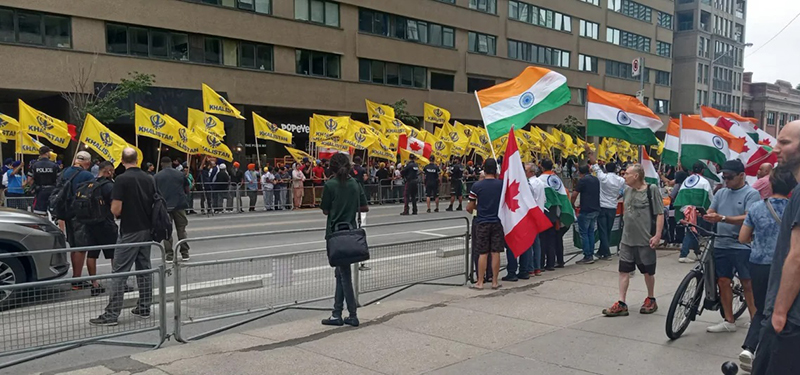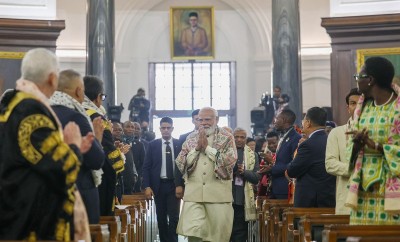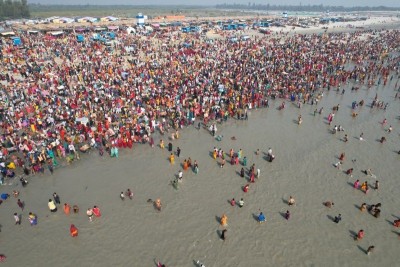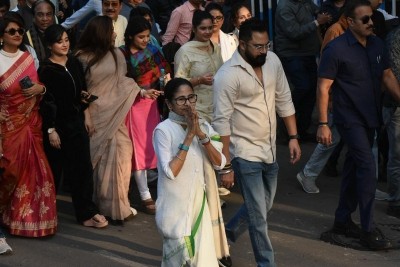 Canada
Canada
Rising extremism and violent threats: Why India withdrew top diplomats from Canada
In a dramatic escalation of diplomatic tensions between India and Canada, the Indian government has made the decision to recall its High Commissioner, Sanjay Kumar Verma, along with other key diplomats, citing concerns over their safety.
This move follows increasing violent threats against Indian diplomats, which India attributes to the current atmosphere of extremism and violence in Canada, particularly linked to pro-Khalistan elements.
On Monday, India’s Ministry of External Affairs (MEA) summoned the Canadian Charge d’Affaires, expressing deep concern over what it described as the “baseless targeting” of Indian diplomats in connection with the ongoing investigation into the murder of Khalistani terrorist Hardeep Singh Nijjar.
Nijjar was killed in Surrey, British Columbia, in June 2023, and the Canadian government has since implicated Indian diplomats as “persons of interest” in the case, a charge India strongly denies.
Rising threats and diplomatic retaliation
In a statement issued after the meeting, India emphasized the dangerous environment created by the Trudeau government’s actions, which it said had endangered the lives of its diplomats.
“In an atmosphere of extremism and violence, the Trudeau government’s actions endangered their safety,” the MEA stated, highlighting the lack of confidence in the Canadian government’s commitment to ensuring the security of Indian officials.
The situation has grown particularly fraught due to the Trudeau administration’s perceived support for separatist and extremist movements, specifically the Khalistan movement, which advocates for the secession of Punjab from India.
Canada has a significant Sikh diaspora, and certain factions within this community have been accused of fostering separatist sentiments.
India has long criticized Canada for allowing pro-Khalistan extremists to operate freely on its soil, seeing this as a direct threat to its sovereignty and internal security.
Given the growing risks, the Indian government announced the withdrawal of High Commissioner Verma, along with other targeted diplomats.
“The Government of India has decided to withdraw the High Commissioner and other targeted diplomats and officials,” the MEA stated, signaling India’s intent to protect its personnel amid rising tensions.
Indian government’s strong rebuttal
Earlier in the day, the MEA delivered a sharp rebuke to Canada’s accusations, labeling them as “preposterous imputations” and rejecting them outright.
The ministry criticized the Canadian government for failing to provide any substantive evidence linking Indian diplomats to Nijjar’s killing, despite numerous requests for clarification.
According to Indian officials, the accusations appear politically motivated, designed to appeal to certain domestic constituencies within Canada.
The Indian government further accused the Trudeau administration of “tacit support” for separatism and extremism, underscoring that India reserves the right to take additional measures should the situation deteriorate further.
The MEA pointed to the Trudeau government’s reliance on political figures within his cabinet who have openly supported the Khalistan movement as a major contributing factor to the current diplomatic impasse.
A strained relationship
Diplomatic relations between India and Canada have been under severe strain since September 2023, when Prime Minister Justin Trudeau accused India of potentially being involved in the murder of Nijjar.
These allegations were vehemently rejected by India, which had designated Nijjar as a terrorist in 2020 for his involvement in separatist activities.
India’s rejection of these accusations is rooted in its belief that Canada has allowed anti-India activities to flourish within its borders, with little regard for the potential diplomatic fallout.
According to Indian officials, the Trudeau government’s political maneuvering—centred around appeasing pro-Khalistan elements within Canada—has resulted in the current state of affairs.
The MEA also highlighted the upcoming testimony Trudeau is expected to give before a Commission on foreign interference, suggesting that these recent developments could be linked to his political challenges at home.
High Commissioner Sanjay Kumar Verma, who has had a distinguished 36-year diplomatic career, now finds himself at the centre of this dispute.
Having served in prominent positions in Japan, Sudan, Italy, Turkey, and China, Verma’s recall represents a significant shift in India’s approach to dealing with Canada amidst growing uncertainty about the safety and treatment of its diplomats.
Way forward
India’s decision to recall its High Commissioner from Canada marks a new low in the two nations’ diplomatic ties, with both sides appearing entrenched in their positions.
While India has accused Canada of failing to curb extremism and protect its diplomats, Canada continues to investigate Nijjar’s killing, maintaining its stance on Indian involvement.
As the geopolitical situation evolves, it remains to be seen how both nations will navigate this crisis and what further steps might be taken to address these mounting concerns.
In the meantime, the safety of Indian diplomats in Canada remains a priority for the Indian government, as it seeks to shield its personnel from the increasing risks posed by what it sees as a dangerous and unchecked atmosphere of extremism.
(The opinions expressed in this article are those of the author. They do not purport to reflect the opinions or views of Khalsa Vox or IBNS)
Support Our Journalism
We cannot do without you.. your contribution supports unbiased journalism
IBNS is not driven by any ism- not wokeism, not racism, not skewed secularism, not hyper right-wing or left liberal ideals, nor by any hardline religious beliefs or hyper nationalism. We want to serve you good old objective news, as they are. We do not judge or preach. We let people decide for themselves. We only try to present factual and well-sourced news.







